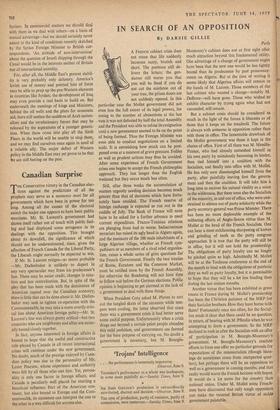Canadian Surprise
THE Conservative victory in the Canadian elec- tions against the predictions of all the prophets may serve as a memento mori for all igovernments which have been in power for too long. Among all the causes of the electoral switch the major one appears to have been public weariness. Mr. St. Laurent's government had shown itself rather out of touch with public feel- ing and had displayed some arrogance in its dealings with the opposition. This brought about its downfall, the significance of which should not be underestimated, since, given the affection of French Canada for the Liberal Party, the Liberals might normally be expected to win.
If Mr. St. Laurent resigns—as seems probable —Mr. Diefenbaker is unlikely to depart in any very spectacular way from his predecessor's line. There may be easier credit, changes in taxa- tion and less centralisation. But, in spite of the play that has been made with the dominance of American capital over the Canadian economy, there is little that can be done about it. Mr. Diefen- baker may seek to tighten co-operation with the Commonwealth; he may take a more overtly criti- cal line about American foreign policy—Mr. St. Latirent's line was always pretty critical—but two countries who are neighbours and allies are natur- ally bound closely together.
In fact, anyone interested in foreign affairs is bound to hope that the useful and constructive role played by Canada in all recent international crises will continue under the new government. No doubt, much of the prestige enjoyed by Cana- dian policy was due to the personality of Mr. Lester Pearson, whose experience and authority were felt by all those who met him. Yet, person- ality is only one factor in foreign affairs, and Canada is peculiarly well placed for exerting a beneficial influence. Part of the American con- tinent, but also bound to Europe and the Com- monwealth, its statesmen can interpret the one to the other in a way difficult for anyone else.


































 Previous page
Previous page